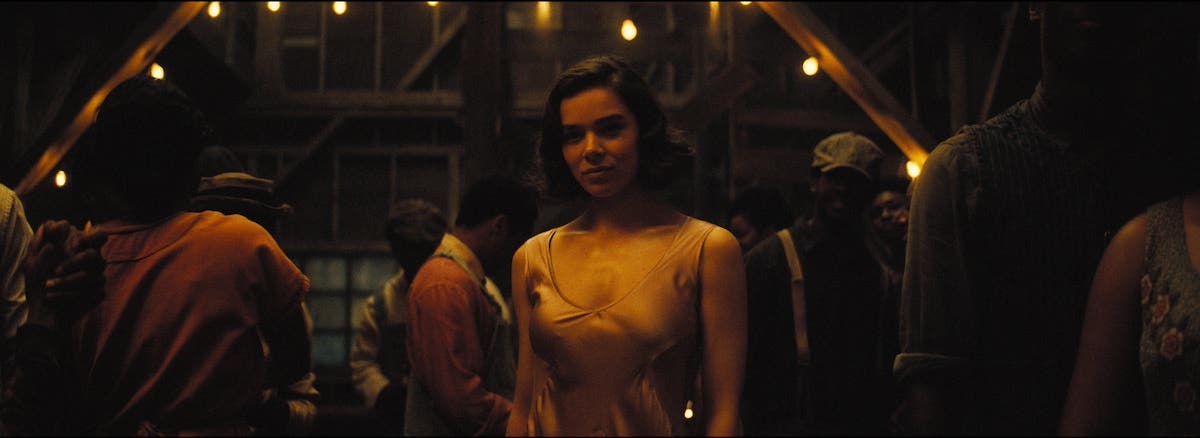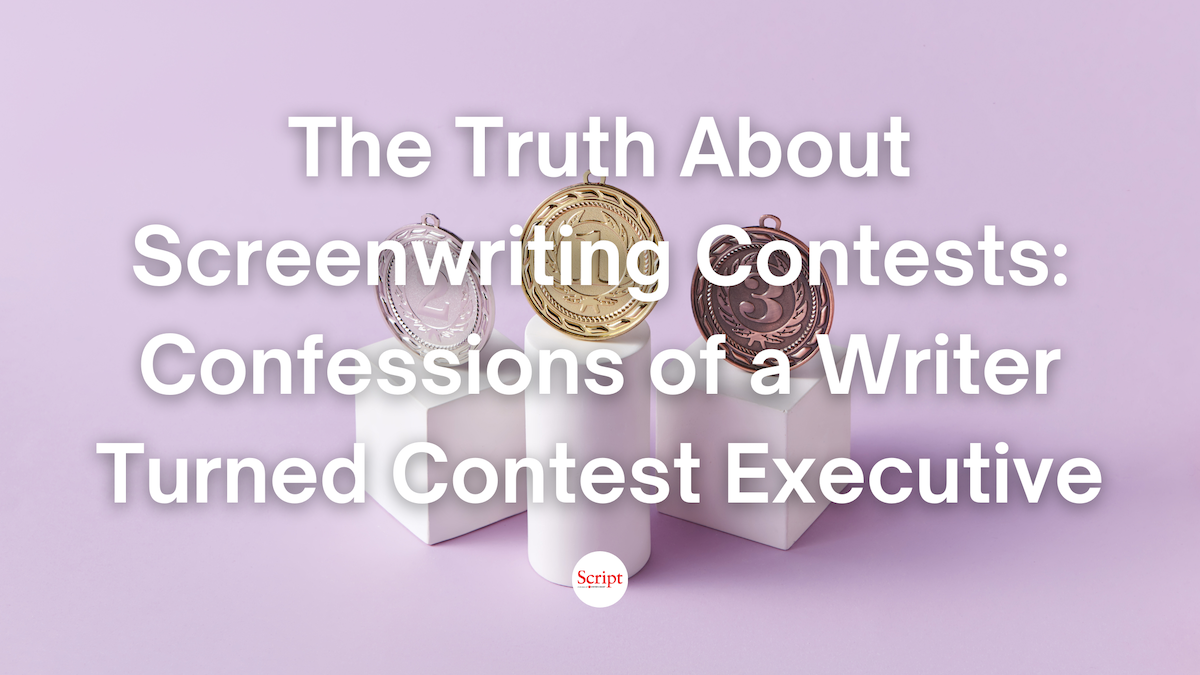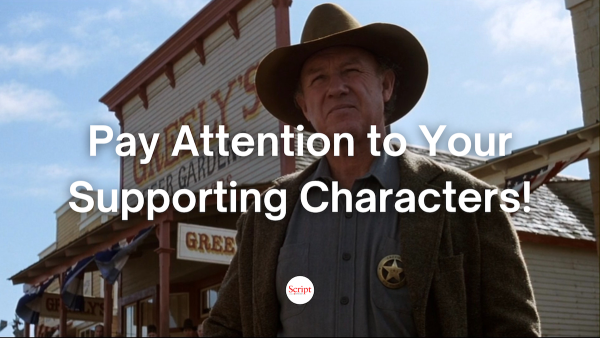BALLS OF STEEL™: The Secret to Finding a Screenwriting Mentor
Jeanne Veillette Bowerman gives tips on how she found the pros to help her improve her craft.
Jeanne Veillette Bowerman is the Editor of Script Magazine and a screenwriter, having written the narrative feature adaptation as well as the limited series of the Pulitzer Prize-winning book, Slavery by Another Name, which was honored in the Top 25 Tracking Board Launch Pad Features Competition. Follow Jeanne on Twitter @jeannevb.
I have been blessed to have amazing mentors, guiding me on my writing career. Often, people ask how I found them.
For a screenwriter trying to break in, finding a screenwriting mentor is akin to finding the Holy Grail. They’re out there… but where do they hide? Is there a secret handshake? How do you find their tree house? More importantly, how do you get past their bodyguards? Despite being a black belt, I’m thinkin’ a chokehold isn’t the friendliest of approaches.
So, how did I get the amazing mentors I have without using brute force? I’m going to give you the secret…
How do you get a screenwriting mentor to want to help you?
Since this post is somewhat of an extension of last week’s ("Balls of Steel: Script Consultants – Are They Worth It?"), I’m going to quote writer/producer of HBO's Band of Brothers, Erik Bork, yet one more time:
When I started out, I don’t know that I had any innate “talent” (if such a thing exists) — but I had the three qualities that I think are most important — passion, openness to feedback, and persistence. I believe if one applies those continuously, they have the best chance of arriving at a point where people will later say they have “talent.”
Talent attracts attention from those farther up the food chain than you are. But sheer talent alone won’t get you a mentor. It’s all in how you behave as a human being.
Do:
- Have passion for your work.
- Be open to honest and constructive feedback.
- Be persistent in pursuing a career.
- Have a desire to improve your skill as a writer.
- Have a positive attitude about the marathon journey.
- Just like your protagonist, you have to be likeable.
- Work hard. Show you have tenacity to get the job done.
- Pay it forward. Don’t underestimate the power and karma of generosity.
Along with the “Dos” are always “Don'ts”
Don’t:
- Upon immediately meeting someone, online or in person, don’t shove your script in their face asking for a read. I call this the first date boob grab. You’re gonna get blocked.
- Don’t be disrespectful if they read your script and give you harsh feedback.
- Don’t immediately unfollow them in social networks if they aren’t connecting with you right away.
- Don’t waste their time with questions you could easily research yourself (see #PIMPtipoftheday below).
- Don’t be the equivalent of a buzzing mosquito and send a zillion emails, and tweets, interrupting their day. You will get squashed.
- Don’t allow them to take time out of their lives to help you, only to give up on yourself and quit.
- Don’t keep going back to them after each rewrite, wanting more and more and more.
- Don’t keep bugging them about feedback like Bart Simpson waiting for his spy camera, “Is it here yet? Is it here yet? Is it here yet?”
Bottom-line, don’t suck. Not in your craft or in your personality.
Since Erik Bork is far more accomplished than I, let’s explore his list more thoroughly, and we’ll use my experience as a case study.
Passion
I’m a big believer in the power of passion. I’m not talking about the casting couch here. I’m referring to having a project that consumes you, making you the only writer possible to bring that story to life.
In fact, my passion for writing Slavery by Another Name (SBAN) was what got me the adaptation gig. I spent six months stalking wooing the author, and later Pulitzer Prize-winner, Douglas A. Blackmon, ultimately winning him over, specifically because of the passion and determination I had for his work. He quickly became my first serious writing mentor.
I’ll never forget the day he finally agreed to work with me, saying he really wanted to say no, but I just wouldn't go away. It was the first time in my life I didn’t make it easy for someone to say no to me. (Read the full story of how I got the gig in 'Balls of Steel: Pursuit of the Project'.)
Passion project. Check.
Persistence. Check.
A bit of insanity. Check. Come on, every writer needs that.
Openness
Now I needed a platform and a social media presence. Not having an agent, I have to be my own pimp. Self-promotion is critical. Get comfortable with it as quickly as you can. It’s said if you build it, they will come. Kevin Costner better be right. My career was counting on it.
I tossed my passion project out into the Twitterverse and created a blog to see who would bite. I received a lot of little nibbles, mostly from up-and-coming writers like myself. While they aren’t “professionals,” many of them are outstanding writers with more experience than I had at the time. NEVER underestimate the value of your peers.
Sidenote: When I speak at conferences on Breaking in Outside of Hollywood, I always tell writers to look to their left and then to their right. One of them might be the next Paul Haggis. Introduce yourself and grow your network from the ground up. By all means, stay in touch after the conference is over!
One day, Unknown Screenwriter stumbled upon my rather active Twitter feed and noticed not only that I was a screenwriter but also made note of my personality.
Rewind. If you’re going to pursue a mentor via Twitter, you must, and I repeat MUST, have a genuine presence there. Be yourself. Be humble. Help other people. Promote their work, not just your own. There’s no way anyone will reach out to help you if you are a selfish jerk (see “don’t suck” above).
#PIMPtipoftheday: Do NOT bug people with questions you could simply Google to find the answer to!
Apologies for the Twitter rant, but that’s one of my pet peeves. Be respectful of people’s time.
Back to mentors…
So, Unknown Screenwriter finds me, and through a series of events, offers to read my script. Notice I did not say I asked. He offered.
The same with Doug Richardson (Die Hard 2, Bad Boys, Hostage). We met on Twitter, had fun banter, and about six months into our friendship, he asked to read my script.
I can hear some of you wondering why a balls-of-steel girl like me didn’t approach them directly to read SBAN. Honestly, I don’t think I would have ever outwardly asked either of them to read it. I was building a relationship with them… a friendship. I wasn’t even thinking about SBAN. I was making friends with other writers and learning from them. I learned an incredible amount from both Unk and Doug. In addition, I wanted to earn their trust, and a huge part of them trusting me included me not being a drain on their time.
I can’t even imagine how many people must ask them to read their scripts. I had no intention of being “one of those people.” (Doug explains why he won’t read scripts in Enter the Gauntlet.)
My philosophy on Twitter was, and continues to be, to pay it forward. I rarely ask for anything from those in my network. I won’t make any apologies for that. I believe in karma.
Both Unk and Doug gave me thoughtful notes. Notes that I digested and then decided which I would implement. I also got notes from other friends. After a few more rewrites, they asked to read it again, curious what I had chosen to change.
#PIMPtipoftheday: Learn how to take notes in a humble, nondefensive way. It is critical to your success as a writer.
More on that later.
After Doug read the rewrite, he called me almost immediately to tell me how much he enjoyed the choices I made. All of a sudden, I wasn't just some wannabe writer. I had earned his respect. He welcomed me into his home, introduced me to his friends, and put me under his wing as a trusted friend. In return, I will honor that trust and work as hard as I can to prove he was right to believe in me.
As for Unk, I asked him the other day why he reached out to help me.
At first, it was because it was a great story that needed to be told. That caused me to ask, ‘Here’s someone who hasn't made it yet, but instead of writing some spec, she went after someone and something huge and nothing stopped her.’ You beat him up until you got him to say yes. Anyone like that is worth helping. Someone who really wants to get somewhere is a person you want to help. Seeing someone in the zone makes you appreciate that. I felt that zone of you going after the author, meeting him and everything you did… all good stuff. That is a hell of a story right there.
Then after reading what you wrote. All the elements were there. Maybe needing rearranging or a tweak, but they were all there. You can’t help but get excited because it’s a great story.
When I asked him what was in it for him to help me, he simply said…
I don't want credit. I want the story to get out there. It’s like helping someone to push their broken down car so they can get some gas. I get out and help push. Especially when you see everyone else passing them up.
Just so you know, they’re my mentors… so back off! Just sayin’.
Persistence
No one wants to put a lot of work into helping someone, only to have them quit when the going gets tough.
Show everyone how hard you’re willing to work to bust the doors open. Even after you have an agent, you’ll still be constantly promoting yourself and knocking on doors. The hustle never ends. If you ask any pro writer, they’ll tell you the same thing.
To prove I have what it takes, I gave myself the same deadline a studio would have given me for a rewrite to not only challenge myself, but also to prove to my mentors, that despite having a full-time job, I could still deliver on time. Trust me. They noticed.
Mentee Turns Mentor: My Biggest Pet Peeve
When I think about the times I’ve helped people, it’s always been because I like them. I genuinely like them. But you have to give people a chance to get to know you in order for that organic relationship to happen.
For the most part, when I make the choice to read someone’s script for the first time, I don’t regret it. Reading scripts, good and bad, is part of becoming a better writer. What makes me regret reading someone’s script is if I feel they simply defend their work and dismiss my notes.
Ummm… why ask me what I think if your response is, “I’ll see what The Black List says,” or “If a producer wants to change it, then I’ll change it”? Clearly my opinion isn’t as important as The Black List or a producer to them, so why ask me to spend a few hours of my already busy life to read the script?
When I read defensive responses from writers, I’m immediately irritated because I took time out from my own writing and deadlines only to have my insights tossed before the writer even digested them.
If you don’t truly respect and appreciate the time and advice someone offers you, you’ll end up burning a bridge. If a writer can’t take notes with professionalism, I’m certainly not passing their name along to a producer I might know, even if that producer is specifically looking for that type of material. Being a successful screenwriter is ALL about taking notes, making changes and being willing to collaborate with no ego.
#PIMPtipoftheday: Be someone people want to work with.
Learning how to accept notes is also a lesson in what it’s like to work with a producer. You’re going to get an endless stream of notes in this career. Learn how to politely smile while someone is bitchslapping your baby and say, “Thank you, Sir, may I have another?”
I have no problem with writers disagreeing with my notes. None at all. I receive plenty of notes I don’t agree with. But don’t tell the note giver someone else’s opinion is more valid than theirs. That’s a red flag to me, and the writer ends up down a notch on my “will read” list.
Rant over.
Pssst… the secret
Beyond Erik’s advice of being passionate, open to feedback and persistent, I’d also add three more qualities to help increase your odds of getting a mentor: work hard to continually improve your writing, have a positive attitude, and pay it forward. I hope one day to be able to help another writer the way Douglas A. Blackmon, Unknown Screenwriter and Doug Richardson have helped me.
So, what’s this big secret of getting someone to want to help you?
I’m sure you’ve noticed one common element in all I shared – find the right project and write it well. The project really does come first, above everything. Find something other people can get excited about and want to put their necks out by bringing it to their own agents.
This industry is next to impossible to penetrate. You’ll need all the help you can get. But you need to earn that help by working hard, being humble, and never giving up. Be willing to stand in the battlefield, holding your bloody sword of victory while surrounded by bodies of writers who weren’t willing to give it their all. Above all, be the kind of person others will pick up swords to defend. If you make them want to be on your team, they’ll always have your back.
Having a mentor doesn't guarantee you’ll get produced, but it certainly makes the ride a hell of a lot more rewarding.
Next week, I'll tell you the secret of why both Unknown Screenwriter and Doug Richardson offered to read SBAN before I ever dreamed of asking. Stay tuned for more tips in Balls of Steel: How to Get Your Screenplay Read Without Asking!
- Balls of Steel Goes Into the Writing Room and Behind the Lines with DR
- Balls of Steel: Hope vs Faith
- Balls of Steel: Positive Attitude
- Balls of Steel: The Zig-Zag Screenwriting Career Path
- Balls of Steel: 10 Tips to Prepare for Opportunities When They Knock
Jeanne Veillette Bowerman is a Senior Executive at Pipeline Media Group and Book Pipeline, Editor-in-Chief of Pipeline Artists, Director of Symposium—a year-round conference in the arts, co-host "Reckless Creatives" podcast, partner at Fringe Press, former Editor-in-Chief of Script magazine and a former Senior Editor at Writer's Digest. Recognized as one of the "Top 10 Most Influential Screenwriting Bloggers," her "Balls of Steel" column was selected as recommended reading by Universal Writers Program. A compilation of her articles is now available at The Writers Store—Balls of Steel: The Screenwriter's Mindset. She is also Co-Founder and moderator of X's weekly screenwriters’ chat, #Scriptchat, and wrote the narrative adaptation of the Pulitzer Prize-winning book, Slavery by Another Name, with its author, Douglas A. Blackmon, former senior national correspondent of The Wall Street Journal. More information can be found on her website. X: @jeannevb | IG/Threads: @jeannevb_ | BlueSky: @jeannevb.bsky.social







